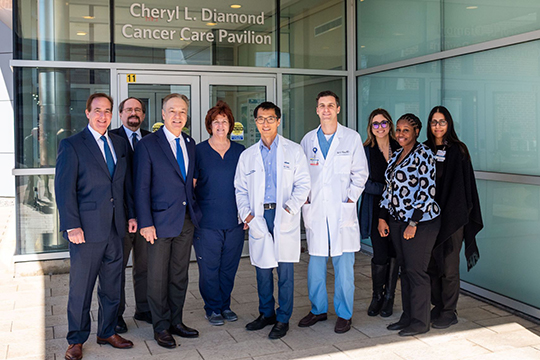
Joining members of the MMC Cancer Services’ team to go blue for colorectal cancer awareness are Chief of Colorectal Surgery Michael Arvanitis, M.D., third from left, colorectal surgeons Roy Dressner, D.O., and Paul Kolarsick, M.D., and radiation oncologist Sang Sim, M.D., center.
Long Branch, NJ, March 14, 2024 – This year in the U.S., approximately 140,000 people will be diagnosed with colorectal cancer, and an estimated 56,000 will die from the disease. Today marks the first day of Colorectal Cancer Awareness Month, celebrated annually in March to raise awareness that colorectal cancer can be prevented through regular screenings, a healthy diet and exercise.
Colorectal cancer is the third most commonly diagnosed cancer in men and women combined in the United States and the second leading cause of cancer death, but early diagnosis and treatment of colon cancer can save lives, according to Monmouth Medical Center (MMC) Chief of Colorectal Surgery Michael Arvanitis, M.D.
“Since there are very few symptoms associated with colorectal cancer, regular screening is essential,” Dr. Arvanitis says. He adds that screening is beneficial for two main reasons: colorectal cancer is preventable if polyps that lead to cancer are detected and removed, and is curable if the cancer is detected in its early stages.
“If detected, colorectal cancer requires surgery in nearly all cases for a complete cure, sometimes in conjunction with radiation and chemotherapy,” he said. He points to studies that show that patients treated by colorectal surgeons — experts in the surgical and nonsurgical treatment of colon and rectal problems — are more likely to survive and have fewer complications.
“In addition to highly experienced colorectal surgeons, Monmouth Medical Center offers the latest colon cancer screening technologies, staffed by caring and highly experienced specialists,” Dr. Arvanitis said. “Additionally, we offer an innovative Enhanced Recovery After Surgery (ERAS) Program that helps patients recover more quickly from colorectal surgery and ensures fewer complications.”
MMC’s ERAS program involves a minimally invasive surgery when indicated, and pain management protocol that decreases the use of narcotic medications. Results include quicker discharge, and very low complication and readmission rates.
“Additionally, through our partnership with Rutgers Cancer Institute of New Jersey, our patients have access to the latest research and most advanced treatment options including clinical trials, immunotherapy and precision medicine,” he said. Rutgers Cancer Institute of New Jersey is the state’s only National Cancer Institute-designated Comprehensive Cancer Center.
Dr. Arvanitis notes that the U.S. Preventative Services Task Force recommends that people begin colorectal cancer screening at age 45, rather than 50, which was the previous recommendation.
“The updated guidelines consider the benefits of early detection and treatment for adults with no personal history or increased risk of the disease,” Dr. Arvanitis says. “Individuals at higher risk should speak to their doctor about getting screened sooner.”
What makes someone higher risk for colorectal cancer?
According to Dr. Arvanitis, you could be at higher than average risk of colorectal cancer if you have:
- A personal history of colorectal cancer or certain types of colon polyps
- A family history of colorectal cancer
- A personal history of inflammatory bowel disease (ulcerative colitis or Crohn's disease)
- A confirmed or suspected genetic colorectal cancer syndrome
- A personal history of getting radiation to the abdomen (belly) or pelvic area to treat a prior cancer
How can the risk be lowered?
- Get regular colorectal cancer screenings. Between 80 percent and 90 percent of colorectal cancer patients are restored to normal health if their cancer is detected and treated in the earliest stages.
- Eat a low-fat, high-fiber diet.
- Drink alcohol only in moderation, and if you use tobacco, quit. Alcohol and tobacco in combination are linked to colorectal cancer and other gastrointestinal cancers.
- Exercise for at least 20 minutes three to four days a week.
If you are due for a routine colon cancer screening, don’t delay scheduling an appointment. Postponement of appointments like cancer screenings could result in delayed diagnosis and treatment. Schedule a colonoscopy or learn more about colorectal cancer screening.
Contact: Kathy Horan
(732) 546-6317
Kathy.Horan@rwjbh.org